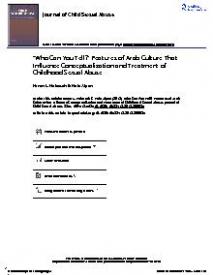"Who can you tell?": features of Arab culture that influence conceptualization and treatment of childhood sexual abuse.
The literature on child sexual abuse reflects growing recognition of the manner in which culture impacts the conceptualization, experience, and treatment of such cases. Despite heightened visibility of Arab Americans within the United States, population due to recent media attention, little empirical research exists on the occurrence of child sexual abuse within this population. Arab culture is often characterized by an emphasis on collectivism and familial obligations, and such features may prove to either facilitate or impede assessment and treatment of child sexual abuse, depending on how they are manifested. In terms of reporting child sexual abuse, cultural values pertaining to shame and honor as well as the stigma attached to mental health problems may influence the response to abuse. As such, enhancing the cultural competence of the therapist is key to facilitating effective cultural practice. Empirical research is required to investigate and substantiate these concepts as they relate to child sexual abuse in Arab-American populations.
Geachte bezoeker,
De informatie die u nu opvraagt, kan door psychotraumanet niet aan u worden getoond. Dit kan verschillende redenen hebben,
waarvan (bescherming van het) auteursrecht de meeste voorkomende is. Wanneer het mogelijk is om u door te verwijzen naar de bron
van deze informatie, dan ziet u hier onder een link naar die plek.
Als er geen link staat, kunt u contact opnemen met de bibliotheek,
die u verder op weg kan helpen.
Met vriendelijke groet,
Het psychotraumanet-team.
Reference:
Karen L. Haboush, & Hala Alyan | 2013
Journal of child sexual abuse : research, treatment and program innovations for victims, survivors and offenders, ISSN 1053-8712 | 22 | 5 | 499-518
http://www.tandfonline.com/doi/abs/10.1080/10538712.2013.800935
Journal of child sexual abuse : research, treatment and program innovations for victims, survivors and offenders, ISSN 1053-8712 | 22 | 5 | 499-518
http://www.tandfonline.com/doi/abs/10.1080/10538712.2013.800935


